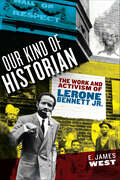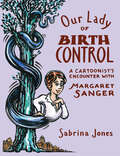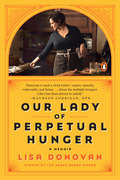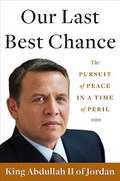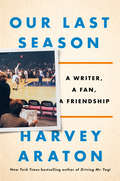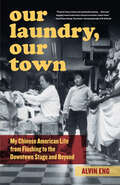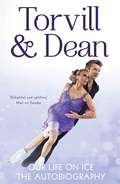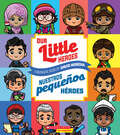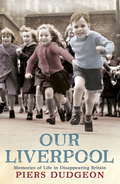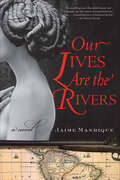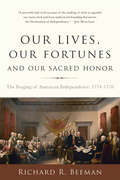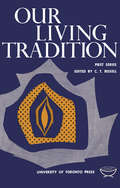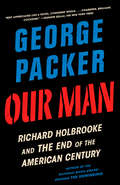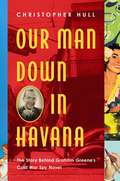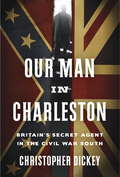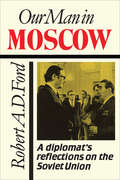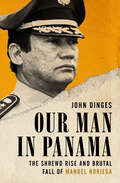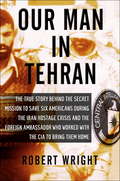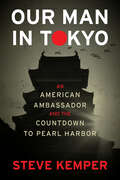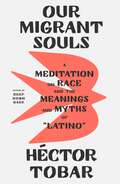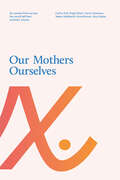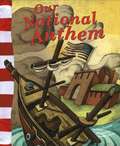- Table View
- List View
Our Kind of Historian: The Work and Activism of Lerone Bennett Jr. (African American Intellectual History)
by E. James WestJournalist, activist, popular historian, and public intellectual, Lerone Bennett Jr. left an indelible mark on twentieth-century American history and culture. Rooted in his role as senior editor of Ebony magazine, but stretching far beyond the boundaries of the Johnson Publishing headquarters in Chicago, Bennett’s work and activism positioned him as a prominent advocate for Black America and a scholar whose writing reached an unparalleled number of African American readers.This critical biography—the first in-depth study of Bennett’s life—travels with him from his childhood experiences in Jim Crow Mississippi and his time at Morehouse College in Atlanta to his later participation in a dizzying range of Black intellectual and activist endeavors. Drawing extensively on Bennett’s previously inaccessible archival collections at Emory University and Chicago State, as well as interviews with close relatives, colleagues, and confidantes, Our Kind of Historian celebrates his enormous influence within and unique connection to African American communities across more than half a century of struggle.
Our Lady of Birth Control: A Cartoonist's Encounter with Margaret Sanger
by Sabrina JonesWorking class nurse. Mother of three. Labor organizer. Margaret Sanger-best known as the pioneer of birth control-was revolutionary in more ways than one. In Sabrina Jones’s graphic novel Our Lady of Birth Control, the author illustrates the incredible life of Margaret Sanger (1879-1966), framing the biography with her personal experiences of coming of age at the height of the sexual revolution.During her lifetime, Sanger transformed herself from working class nurse to an exuberant free-lover and savvy manipulator of the media, the law, and her wealthy supporters. Through direct action, propaganda, exile, and imprisonment, she ultimately succeeded in bringing legal access to birth control to women of all classes. Sanger’s revolutionary actions established organizations that eventually evolved into Planned Parenthood Federation of America.Jones’s autobiographical sections of Our Lady of Birth Control show her journey into activist art in response to the anti-feminist backlash of the Reagan era. From street theater and protest graphics to alternative comics, her path similarly follows in Margaret’s footsteps, encountering versions of the same adversaries. Her striking imagery evokes the late 20th century, recalling the ashcan artists of The Masses, an acclaimed magazine of Sanger’s formative years.Powerful, poetic, and extremely personal, this historical graphic novel is an in-depth look at the woman responsible for bringing freedom to the masses.
Our Lady of Perpetual Hunger: A Memoir
by Lisa DonovanRenowned southern pastry chef Lisa Donovan's memoir of cooking, survival, and the incredible power in reclaiming the stories of womenNoted chef and James Beard Award-winning essayist Lisa Donovan helped establish some of the South's most important kitchens, and her pastry work is at the forefront of a resurgence in traditional desserts. Yet Donovan struggled to make a living in an industry where male chefs built successful careers on the stories, recipes, and culinary heritage passed down from generations of female cooks and cooks of color. At one of her career peaks, she made the perfect dessert at a celebration for food-world goddess Diana Kennedy. When Kennedy asked why she had not heard of her, Donovan said she did not know. "I do," Kennedy said, "Stop letting men tell your story." OUR LADY OF PERPETUAL HUNGER is Donovan's searing, beautiful, and searching chronicle of reclaiming her own story and the narrative of the women who came before her. Her family's matriarchs found strength and passion through food, and they inspired Donovan's accomplished career. Donovan's love language is hospitality, and she wants to welcome everyone to the table of good food and fairness. Donovan herself had been told at every juncture that she wasn't enough: she came from a struggling southern family that felt ashamed of its own mixed race heritage and whose elders diminished their women. She survived abuse and assault as a young mother. But Donovan's salvations were food, self-reliance, and the network of women in food who stood by her. In the school of the late John Egerton, OUR LADY OF PERPETUAL HUNGER is an unforgettable Southern journey of class, gender, and race as told at table.
Our Last Best Chance
by King Abdullah II of JordanA call for peace by the most dynamic leader of the Arab world. At a time of unprecedented upheaval in the Middle East, King Abdullah II of Jordan is almost unique in enjoying widespread popular support. He is the ultimate modern-day monarch, as comfortable at a business conference as he is at a meeting of the Arab League. In this prescient memoir-cum-manifesto, he makes an urgent plea to push for a solution to the Arab-Israeli crisis. He writes with disarming frankness about his own upbringing and warns of the brewing resentment in the region. A call to arms by the most dynamic young ruler in the Arab world, Our Last Best Chance helps explain the volatile underpinnings of the new Arab awakening.
Our Last Season: A Writer, a Fan, a Friendship
by Harvey AratonThe moving story of a bond between sportswriter and fan that was forged in a shared love of basketball and grew over several decades into an extraordinary friendship "This is a story about friendship, sports, aging, and ultimately time itself--the things it strips away and the things it cannot touch. I loved it."--Wright Thompson, author of The Cost of These DreamsHarvey Araton is one of New York's--and the nation's--best-known sports journalists, having covered thousands of Knicks games over the course of a long and distinguished career. But the person at the heart of Our Last Season, Michelle Musler, is largely anonymous--except, that is, to the players, coaches, and writers who have passed through Madison Square Garden, where she held season tickets behind the Knicks bench for 45 years. In that time, as she juggled a successful career as a corporate executive and single parenthood of five children, she missed only a handful of home games. The Garden was her second home--and the place where an extraordinary friendship between fan and sportswriter was forged. That relationship soon grew into something much bigger than basketball, with Michelle serving as a cherished mentor and friend to Harvey as he weathered life's inevitable storms: illness, aging, and professional challenges and transitions. During the 2017-18 NBA season, as Michelle faces serious illness that prevents her from attending more than a few Knicks games, Harvey finally has the chance to give back to Michelle everything she has given him: reminders of all she's accomplished, the blessings she's enjoyed, and the devoted friend she has been to him. Chock-full of anecdotes from behind the scenes and cameos from Knicks legends--from Frazier, King, and Ewing to Riley, Van Gundy, and many more--the story of Harvey and Michelle's nearly four decades of friendship is a delight for basketball fans. But at its core, Our Last Season is a book for all of us, offering a poignant and inspiring message about how to live with passion, commitment, and optimism.
Our Laundry, Our Town: My Chinese American Life from Flushing to the Downtown Stage and Beyond
by Alvin EngWith humor and grace, the memoir of a first-generation Chinese American in New York CityOur Laundry, Our Town is a memoir that decodes and processes the fractured urban oracle bones of Alvin Eng's upbringing in Flushing, Queens in the 1970s. Back then, his family was one of the few immigrant Chinese families in a far-flung neighborhood in New York City. His parents had an arranged marriage and ran a Chinese Hand Laundry. From behind the counter of his parent’s laundry and within the confines of a household that was rooted in a different century and culture, he sought to reconcile this insular home life with the turbulent yet inspiring street life that was all around them––from the faux martial arts of tv’s Kung Fu to the burgeoning underworld of the punk rock scene. In the 1970s, NYC, like most of the world, was in the throes of regenerating itself in the wake of major social and cultural changes resulting from the Counterculture and Civil Rights movements. And by the 1980s, Flushing had become NYC’s second Chinatown. But Eng remained one of the neighborhood’s few Chinese citizens who could not speak fluent Chinese. Finding his way in the downtown theater and performance world of Manhattan, he discovered the under-chronicled Chinese influence on Thornton Wilder’s foundational Americana drama, Our Town. This discovery became the unlikely catalyst for a psyche-healing pilgrimage to Hong Kong and Guangzhou, China—his ancestral home in southern China—that led to writing and performing his successful autobiographical monologue, The Last Emperor of Flushing. Learning to tell his own story on stages around the world was what proudly made him whole. As cities, classrooms, cultures, and communities the world over continue to re-examine the parameters of diversity, equity, and inclusion, Our Laundry, Our Town will reverberate with a broad readership.
Our Legends
by V. K. Kapur D. B. SinghLife and works of many eminent personalities of the recent past.
Our Life on Ice
by Christopher Dean Jayne TorvillWhen Jayne Torvill and Christopher Dean collapsed to the ice at the climax of their routine to Bolero in the 1984 Winter Olympics, the judges could find no fault, awarding them 12 maximum scores of 6.0, while 24 million viewers watching at home in Britain simply looked on in amazement. Suddenly, we were all experts in figure skating, and we wanted to know more about the couple at the heart of it all. Despite intense interest in them, Torvill & Dean kept their lives private, with many still wondering if the pair were really a couple. They turned professional and would eventually spend eight years working on ITV's Dancing on Ice, but still much of their story remained unknown. Now, in Our Life on Ice, Torvill & Dean finally open up about the challenges they have faced and the pressures of life in the public eye: Jayne speaks candidly about her struggle with husband Phil to start a family, while Chris reveals the heartache in his family story. And of course, there is the skating, and the stories about what inspired their famous routines, and what the pair hope to achieve in the future as the approach their fortieth anniversary working together. It is the book their millions of fans have been waiting to read.
Our Little Heroes / Nuestros pequeños héroes
by David HerediaSay hello to heroes! This book introduces preschoolers to 50 men and women of color who have changed the world!Desde Toussaint L'Overture, el líder de la Revolución haitiana, hasta la jueza Sonia Sotomayor, la primera puertorriqueña jueza de la Corte Suprema de Estados Unidos, estos héroes y heroínas persistieron contra la adversidad y las dificultades para lograr un cambio positivo.From Toussaint L'Ouverture, the leader of the Haitian Revolution, to Justice Sonia Sotomayor, the first Supreme Court Justice from Puerto Rico, these heroes have persisted through adversity and hardships to bring about positive change.
Our Liverpool: Memories of Life in Disappearing Britain
by Piers DudgeonThis ebook edition contains the full text version as per the book. Doesn't include original photographic and illustrated material. OUR LIVERPOOL is an oral history about the real Liverpool - about the city before its slick transformation to European City of Culture and about the spirit that remains at its heart. Here, at last, is Liverpool's grievous and glorious past. And here, through the people's voices, we find old Liverpool, without the gift-wrap. Its stories pulsate with the rhythms of an alternately funny, flippant, belligerent, stubborn and warm heart, and they broadcast the values of a community, which are the city's true legacy to the modern world. Piers Dudgeon has listened to dozens of people who remember the city as it was, and who have lived through its many changes. They talk of childhood and education, of work and entertainment, of family, community values, health, politics, religion and music. Their stories will make you laugh and cry. It is people's own memories that make history real and this engrossing book captures them vividly.
Our Lives Are the Rivers: A Novel
by Jaime Manrique“A compelling story that melds history and biography into the context of a passionate love affair, Our Lives Are the Rivers is a masterful piece of historical fiction.” — San Francisco ChronicleFrom critically acclaimed author Jaime Manrique comes a breathtaking novel based on the life of one of the most controversial women in the history of the AmericasOur Lives Are the Rivers tells the sweeping story of beautiful young freedom fighter Manuela Saenz, and the epic tale of her love affair with liberator Simón Bolívar. A novel of intoxicating love, passion, and adventure, Manrique vividly captures a dynamic continent struggling for its own identity and a woman willing to risk it all for her country—and her lover—in whose legacy lies the history of an entire continent.
Our Lives, Our Fortunes and Our Sacred Honor: The Forging of American Independence, 1774-1776
by Richard R. BeemanIn 1774 American independence was hardly inevitable--indeed, most Americans found it neither desirable nor likely. When delegates from the thirteen colonies gathered in September 1774, they were, in the words of John Adams, "a gathering of strangers. " With their differing interests and cultural perspectives, perhaps the only thing that bound them together was their common identity as subjects of the British Crown. But as they confronted the array of political, diplomatic, and military challenges facing them during the twenty-two months before the signing of the Declaration of Independence, they gradually shed both their provincial and their British identities and became leaders of an American cause. With narrative verve and deep historical understanding, Richard R. Beeman tells the remarkable story of how the delegates to the Continental Congress, through courage and compromise, came to dedicate their lives, their fortunes, and their sacred honor to the forging of American independence.
Our Living Tradition: First Series
by Claude BissellIn this book, seven distinguished scholars and writers discuss seven leading figures in the history of Canadian letters and public affairs. Frank H. Underhill, historian, describes the tragic career of Edward Blake, one of the ablest men who ever entered Canadian politics. D.G. Creighton, author of the definitive biography of Sir John A. Macdonald, writes of this politician whose solid achievements mock the facile depreciations of his character current during his lifetime and after. Mason Wade, author of The French-Canadians, describes the career of Sir Wilfrid Laurier, who pledged as a law student, "I will give the whole of my life to the cause of conciliation, harmony, and concord among the different elements of his country of ours."Robertson Davies, playwright, author, and critic, writes with penetration and sympathy of Stephen Leacock, the humorist; Munro Beattie, professor of English, of Archibald Lampman's poetry, particularly as related to Ottawa, the city in which he lived and wrote; Wilfrid Eggleston, journalist and poet, of Frederick Philip Grove, "the first serious exponent of realism in our fiction." Malcolm Ross, professor of English, editor, and critic tells of Goldwin Smith, that complex and contradictory figure---the architect of "Canada First," who yet "had no sense whatever of the national feeling of born Canadians."
Our Man: Richard Holbrooke and the End of the American Century
by George PackerFrom the award-winning author of The Unwinding--the vividly told saga of the ambition, idealism, and hubris of one of the most legendary and complicated figures in recent American history, set amid the rise and fall of U.S. power from Vietnam to Afghanistan"I doubt that any novel, not even one co-written by Graham Greene and F. Scott Fitzgerald, could have captured Holbrooke fully, and I certainly thought that no biography ever would. But now one has. George Packer's Our Man portrays Holbrooke in all his endearing and self-willed glory.... Both a sweeping diplomatic history and a Shakespearean tragicomedy." --Walter Isaacson, The New York Times Book ReviewRichard Holbrooke was brilliant, utterly self-absorbed, and possessed of almost inhuman energy and appetites. Admired and detested, he was the force behind the Dayton Accords that ended the Balkan wars, America's greatest diplomatic achievement in the post-Cold War era. His power lay in an utter belief in himself and his idea of a muscular, generous foreign policy. From his days as a young adviser in Vietnam to his last efforts to end the war in Afghanistan, Holbrooke embodied the postwar American impulse to take the lead on the global stage. But his sharp elbows and tireless self-promotion ensured that he never rose to the highest levels in government that he so desperately coveted. His story is thus the story of America during its era of supremacy: its strength, drive, and sense of possibility, as well as its penchant for overreach and heedless self-confidence. In Our Man, drawn from Holbrooke's diaries and papers, we are given a nonfiction narrative that is both intimate and epic in its revelatory portrait of this extraordinary and deeply flawed man and the elite spheres of society and government he inhabited.
Our Man Down in Havana: The True Cold War Story Behind Graham Greene's Espionage Satire
by Christopher HullExploring the backstory that led to the writing of Graham Greene's beloved satirical spy novel, Our Man Down in Havana evokes this pivotal time and place in the author's life. When U.S. immigration authorities deported Graham Greene from Puerto Rico in 1954, the British author made an unplanned visit to Havana and discovered that “every vice was permissible and every trade possible” in a Caribbean fleshpot of mafia-run casinos and nude revues. The former MI6 officer had stumbled upon the ideal setting for a comic espionage story. Three years later, he returned in the midst of Fidel Castro’s guerrilla insurgency against a U.S.-backed dictator to begin writing his iconic novel Our Man in Havana. Twelve weeks after its publication, the Cuban Revolution triumphed in January 1959, soon transforming a capitalist playground into a communist stronghold. Combining biography, history, and politics, Our Man Down in Havana investigates the real story behind Greene’s fictional one. This includes his many visits to a pleasure island that became a revolutionary island, turning his chance involvement into a political commitment. His Cuban novel describes an amateur agent who dupes his intelligence chiefs with invented reports about “concrete platforms and unidentifiable pieces of giant machinery.” With eerie prescience, Greene’s satirical tale had foretold the Cold War’s most perilous episode, the 1962 Cuban Missile Crisis. Exploiting a wealth of archival material and interviews with key protagonists, Our Man Down in Havana delves into the story behind and beyond the author’s prophetic Cuban tale, focusing on one slice of Greene’s manic life: a single novel and its complex history.
Our Man in Charleston: Britain's Secret Agent in the Civil War South
by Christopher DickeyBetween the Confederacy and recognition by Great Britain stood one unlikely Englishman who hated the slave trade. His actions helped determine the fate of a nation. When Robert Bunch arrived in Charleston to take up the post of British consul in 1853, he was young and full of ambition, but even he couldn't have imagined the incredible role he would play in the history-making events to unfold. In an age when diplomats often were spies, Bunch's job included sending intelligence back to the British government in London. Yet as the United States threatened to erupt into Civil War, Bunch found himself plunged into a double life, settling into an amiable routine with his slavery-loving neighbors on the one hand, while working furiously to thwart their plans to achieve a new Confederacy. As secession and war approached, the Southern states found themselves in an impossible position. They knew that recognition from Great Britain would be essential to the survival of the Confederacy, and also that such recognition was likely to be withheld if the South reopened the Atlantic slave trade. But as Bunch meticulously noted from his perch in Charleston, secession's red-hot epicenter, that trade was growing. And as Southern leaders continued to dissemble publicly about their intentions, Bunch sent dispatch after secret dispatch back to the Foreign Office warning of the truth--that economic survival would force the South to import slaves from Africa in massive numbers. When the gears of war finally began to turn, and Bunch was pressed into service on an actual spy mission to make contact with the Confederate government, he found himself in the middle of a fight between the Union and Britain that threatened, in the boast of Secretary of State William Seward, to "wrap the world in flames." In this masterfully told story, Christopher Dickey introduces Consul Bunch as a key figure in the pitched battle between those who wished to reopen the floodgates of bondage and misery, and those who wished to dam the tide forever. Featuring a remarkable cast of diplomats, journalists, senators, and spies, Our Man in Charleston captures the intricate, intense relationship between great powers on the brink of war.From the Hardcover edition.
Our Man in Moscow: A Diplomat's Reflections on the Soviet Union
by Robert Ford"The world is large; Russia is great; death is inevitable." Almost forty years ago Robert A.D. Ford came across this sentence in a Russian school primer. It stays with him today as an example of the Russian psyche, a psyche that Ford is better equipped to explain than most. He is the only Western diplomat to have known and dealt with all the Soviet leaders from the end of the Second World War to the present: Stalin, Krushchev, Brezhnev, Gorbachev. As a poet and translator of Russian poetry, he also had a special entrée into the Soviet literary world. In this memoir he offers a unique perspective on post-war Soviet politics and Russian life.
Our Man in Panama: The Shrewd Rise and Brutal Fall of Manuel Noriega
by John DingesA &“carefully researched&” account of the rise and fall of notorious dictator Manuel Noriega—and America&’s role in both (The Washington Post). Written by a prize-winning NPR veteran who spent years covering Latin America, this blend of biography, history, and political reporting details the events that lead to the American invasion of Panama. &“Describes in considerable detail the fascinating and appalling relationship between Noriega and the U.S. government. Much of this material was derived from previously classified documents, supplemented by Congressional hearings and interviews. [John] Dinges has taken great care to verify his sources; hearsay, gossip, and questionable testimony is not presented here . . . Highly recommended.&” —Library Journal &“Most of the action takes place in Panama, of course, but it is still very much a Washington story. Few of the characters, from President Bush on down, emerge with dignity intact.&” —The New York Times &“One of the best analyses of American foreign policy failures in Panama.&” —The New Republic A New York Times Notable Book of the Year
Our Man in Tehran: The Truth Behind the Secret Mission to Save Six Americans During the Iran Hostage Crisis and the Ambassador Who Worked with the CIA to Bring Them Home
by Robert WrightThe world watched with fear in November 1979, when Iranian students infiltrated and occupied the American embassy in Tehran. The Americans were caught entirely by surprise, and what began as a swift and seemingly short-lived takeover evolved into a crisis that would see fifty four embassy personnel held hostage, most for 444 days. As Tehran exploded in a fury of revolution, six American diplomats secretly escaped. For three months, Ken Taylor, the Canadian ambassador to Iran-along with his wife and embassy staffers-concealed the Americans in their homes, always with the prospect that the revolutionary government of Ayatollah Khomeini would exact deadly consequences. The United States found itself handcuffed by a fractured, fundamentalist government it could not understand and had completely underestimated. With limited intelligence resources available on the ground and anti-American sentiment growing, President Carter turned to Taylor to work with the CIA in developing their exfiltration plans. Until now, the true story behind Taylor's involvement in the escape of the six diplomats and the Eagle Claw commando raid has remained classified. InOur Man in Tehran,Robert Wright takes us back to a major historical flashpoint and unfolds a story of cloak-and-dagger intrigue that brings a new understanding of the strained relationship between the Unites States and Iran. With the world once again focused on these two countries, this book is the stuff of John le Carreacute; and Daniel Silva made real.
Our Man In Tokyo: An American Ambassador and the Countdown to Pearl Harbor
by Steve KemperWinner of the American Academy of Diplomacy’s Dillon Book Award"Gripping history, offering both drama and suspense." —Wall Street JournalA riveting, behind-the-scenes account of the personalities and contending forces in Tokyo during the volatile decade that led to World War II, as seen through the eyes of the American ambassador who attempted to stop the slide to war.In 1932, Japan was in crisis. Naval officers had assassinated the prime minister and conspiracies flourished. The military had a stranglehold on the government. War with Russia loomed, and propaganda campaigns swept the country, urging schoolchildren to give money to procure planes and tanks. Into this maelstrom stepped Joseph C. Grew, America’s most experienced and talented diplomat. When Grew was appointed ambassador to Japan, not only was the country in turmoil, its relationship with America was rapidly deteriorating. For the next decade, Grew attempted to warn American leaders about the risks of Japan’s raging nationalism and rising militarism, while also trying to stabilize Tokyo’s increasingly erratic and volatile foreign policy. From domestic terrorism by Japanese extremists to the global rise of Hitler and the fateful attack on Pearl Harbor, the events that unfolded during Grew’s tenure proved to be pivotal for Japan, and for the world. His dispatches from the darkening heart of the Japanese empire would prove prescient—for his time, and for our own. Drawing on Grew’s diary of his time in Tokyo as well as U.S. embassy correspondence, diplomatic dispatches, and firsthand Japanese accounts, Our Man in Tokyo brings to life a man who risked everything to avert another world war, the country where he staked it all—and the abyss that swallowed it.
Our Migrant Souls: A Meditation on Race and the Meanings and Myths of “Latino”
by Héctor TobarA new book by the Pulitzer Prize–winning writer about the twenty-first-century Latino experience and identity."Latino" is the most open-ended and loosely defined of the major race categories in the United States. Our Migrant Souls: A Meditation on Race and the Meanings and Myths of "Latino" assembles the Pulitzer Prize winner Héctor Tobar's personal experiences as the son of Guatemalan immigrants and the stories told to him by his Latinx students to offer a spirited rebuke to racist ideas about Latino people. Our Migrant Souls decodes the meaning of "Latino" as a racial and ethnic identity in the modern United States, and seeks to give voice to the angst and anger of young Latino people who have seen latinidad transformed into hateful tropes about "illegals" and have faced insults, harassment, and division based on white insecurities and economic exploitation.Investigating topics that include the US-Mexico border "wall," Frida Kahlo, urban segregation, gangs, queer Latino utopias, and the emergence of the cartel genre in TV and film, Tobar journeys across the country to expose something truer about the meaning of "Latino" in the twenty-first century.
Our Moon has Blood Clots: The Exodus Of The Kashmiri Pandits
by Rahul PanditaRahul Pandita was fourteen years old in 1990 when he was forced to leave his home in Srinagar along with his family, who were Kashmiri Pandits: the Hindu minority within a Muslim majority Kashmir that was becoming increasingly agitated with the cries of ‘Azadi’ from India. The heartbreaking story of Kashmir has so far been told through the prism of the brutality of the Indian state, and the pro-independence demands of separatists. But there is another part of the story that has remained unrecorded and buried. Our Moon Has Blood Clots is the unspoken chapter in the story of Kashmir, in which it was purged of the Kashmiri Pandit community in a violent ethnic cleansing backed by Islamist militants. Hundreds of people were tortured and killed, and about 3,50,000 Kashmiri Pandits were forced to leave their homes and spend the rest of their lives in exile in their own country. Rahul Pandita has written a deeply personal, powerful and unforgettable story of history, home and loss.
Our Mothers Ourselves: Six women from across the world tell their mothers' stories
by Cathy HullIn a world shaken by the great upheavals of World War and the collapse of Empire, six women from different corners of the world transcend the constraints of their different backgrounds. Their physical and emotional migrations open the way to personal journeys which redefine them and enable their daughters to live lives of greater personal freedom and fulfillment. This book tells the stories of our mothers, six ordinary women who undertook extraordinary journeys. It is a tribute and an expression of love.
Our Mothers' Spirits
by Bob Blauneran anthology of pieces by great writers on the death of mothers and the grief of men.
Our National Anthem
by Norman PearlIf you love your country, sing! Since 1931, "The Star-Spangled Banner" has been the national anthem of the United States. Journey back to 1814, and join Francis Scott Key, the man who wrote the words to the anthem, for a close look at this song of freedom.
